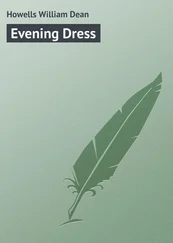William Howells - Imaginary Interviews
Здесь есть возможность читать онлайн «William Howells - Imaginary Interviews» — ознакомительный отрывок электронной книги совершенно бесплатно, а после прочтения отрывка купить полную версию. В некоторых случаях можно слушать аудио, скачать через торрент в формате fb2 и присутствует краткое содержание. Жанр: foreign_prose, на английском языке. Описание произведения, (предисловие) а так же отзывы посетителей доступны на портале библиотеки ЛибКат.
- Название:Imaginary Interviews
- Автор:
- Жанр:
- Год:неизвестен
- ISBN:нет данных
- Рейтинг книги:3 / 5. Голосов: 1
-
Избранное:Добавить в избранное
- Отзывы:
-
Ваша оценка:
- 60
- 1
- 2
- 3
- 4
- 5
Imaginary Interviews: краткое содержание, описание и аннотация
Предлагаем к чтению аннотацию, описание, краткое содержание или предисловие (зависит от того, что написал сам автор книги «Imaginary Interviews»). Если вы не нашли необходимую информацию о книге — напишите в комментариях, мы постараемся отыскать её.
Imaginary Interviews — читать онлайн ознакомительный отрывок
Ниже представлен текст книги, разбитый по страницам. Система сохранения места последней прочитанной страницы, позволяет с удобством читать онлайн бесплатно книгу «Imaginary Interviews», без необходимости каждый раз заново искать на чём Вы остановились. Поставьте закладку, и сможете в любой момент перейти на страницу, на которой закончили чтение.
Интервал:
Закладка:
"Not toward immodesty?"
"No, not so much that. But the fine intellectual superiority of the continuous performance is beginning to suffer contamination from the plays where there are waits between the acts. I spoke just now of the tramp magician, but I see him no longer at the variety houses. The comic musician is of the rarest occurrence; during the whole season I have as yet heard no cornet solo on a revolver or a rolling-pin. The most dangerous acts of the trapeze have been withdrawn. The acrobats still abound, but it is three long years since I looked upon a coon act with real Afro-Americans in it, or saw a citizen of Cincinnati in a fur overcoat keeping a silk hat, an open umbrella, and a small wad of paper in the air with one hand. It is true that the conquest of the vaudeville houses by the full-fledged drama has revived the old-fashioned stock companies in many cases, and has so far worked for good, but it is a doubtful advantage when compared with the loss of the direct inspiration of the artists who created and performed their stunts."
"Delightful word!" we dreamily noted. "How did it originate?"
"Oh, I don't know. It's probably a perversion of stint, a task or part, which is also to be found in the dictionary as stent. What does it matter? There is the word, and there is the thing, and both are charming. I approve of the stunt because it is always the stuntist's own. He imagined it, he made it, and he loves it. He seems never to be tired of it, even when it is bad, and when nobody in the house lends him a hand with it. Of course, when it comes to that, it has to go, and he with it. It has to go when it is good, after it has had its day, though I don't see why it should go; for my part there are stunts I could see endlessly over again, and not weary of them. Can you say as much of any play?"
"Gilbert and Sullivan's operas," we suggested.
"That is true. But without the music? And even with the music, the public won't have them any longer. I would like to see the stunt fully developed. I should like to have that lovely wilding growth delicately nurtured into drama as limitless and lawless as life itself, owing no allegiance to plot, submitting to no rule or canon, but going gayly on to nothingness as human existence does, full of gleaming lights, and dark with inconsequent glooms, musical, merry, melancholy, mad, but never-ending as the race itself."
"You would like a good deal more than you are ever likely to get," we said; and here we thought it was time to bring our visitor to book again. "But about the decline of vaudeville?"
"Well, it isn't grovelling yet in the mire with popular fiction, but it is standing still, and whatever is standing still is going backward, or at least other things are passing it. To hold its own, the vaudeville must grab something more than its own. It must venture into regions yet unexplored. It must seize not only the fleeting moments, but the enduring moments of experience; it should be wise not only to the whims and moods, but the passions, the feelings, the natures of men; for it appeals to a public not sophisticated by mistaken ideals of art, but instantly responsive to representations of life. Nothing is lost upon the vaudeville audience, not the lightest touch, not the airiest shadow of meaning. Compared with the ordinary audience at the legitimate theatres – "
"Then what you wish," we concluded, "is to elevate the vaudeville."
The visitor got himself out of the Easy Chair, with something between a groan and a growl. "You mean to kill it."
V
INTIMATIONS OF ITALIAN OPERA
Whether pleasure of the first experience is more truly pleasure than that which comes rich in associations from pleasures of the past is a doubt that no hedonistic philosopher seems to have solved yet. We should, in fact, be sorry if any had, for in that case we should be without such small occasion as we now have to suggest it in the forefront of a paper which will not finally pass beyond the suggestion. When the reader has arrived at our last word we can safely promise him he will still have the misgiving we set out with, and will be confirmed in it by the reflection that no pleasure, either of the earliest or the latest experience, can be unmixed with pain. One will be fresher than the other; that is all; but it is not certain that the surprise will have less of disappointment in it than the unsurprise. In the one case, the case of youth, say, there will be the racial disappointment to count with, and in the other, the case of age, there will be the personal disappointment, which is probably a lighter thing. The racial disappointment is expressed in what used to be called, somewhat untranslatably, Weltschmerz . This was peculiarly the appanage of youth, being the anticipative melancholy, the pensive foreboding, distilled from the blighted hopes of former generations of youth. Mixed with the effervescent blood of the young heart, it acted like a subtle poison, and eventuated in more or less rhythmical deliriums, in cynical excesses of sentiment, in extravagances of behavior, in effects which commonly passed when the subject himself became ancestor, and transmitted his inherited burden of Weltschmerz to his posterity. The old are sometimes sad, on account of the sins and follies they have personally committed and know they will commit again, but for pure gloom – gloom positive, absolute, all but palpable – you must go to youth. That is not merely the time of disappointment, it is in itself disappointment; it is not what it expected to be; and it finds nothing which confronts it quite, if at all, responsive to the inward vision. The greatest, the loveliest things in the world lose their iridescence or dwindle before it. The old come to things measurably prepared to see them as they are, take them for what they are worth; but the young are the prey of impassioned prepossessions which can never be the true measures.
The disadvantage of an opening like this is that it holds the same quality, if not quantity, of disappointment as those other sublime things, and we earnestly entreat the reader to guard himself against expecting anything considerable from it. Probably the inexperienced reader has imagined from our weighty prologue something of signal importance to follow; but the reader who has been our reader through thick and thin for many years will have known from the first that we were not going to deal with anything more vital, say, than a few emotions and memories, prompted, one night of the other winter, by hearing one of the old-fashioned Italian operas which a more than commonly inspired management had been purveying to an over-Wagnered public. In fact, we had a sense that this sort of reader was there with us the night we saw "L'Elisir d'Amore," and that it was in his personality we felt and remembered many things which we could have fancied personal only to ourselves.
He began to take the affair out of our keeping from the first moment, when, after passing through the crowd arriving from the snowy street, we found our way through the distracted vestibule of the opera-house into the concentred auditorium and hushed ourselves in the presence of the glowing spectacle of the stage. "Ah, this is the real thing," he whispered, and he would not let us, at any moment when we could have done so without molesting our neighbors, censure the introduction of Alpine architecture in the entourage of an Italian village piazza. "It is a village at the foot of the Alps probably," he said, "and if not, no matter. It is as really the thing as all the rest: as the chorus of peasants and soldiers, of men and women who impartially accompany the orchestra in the differing sentiments of the occasion; as the rivals who vie with one another in recitative and aria; as the heroine who holds them both in a passion of suspense while she weaves the enchantment of her trills and runs about them; as the whole circumstance of the divinely impossible thing which defies nature and triumphs over prostrate probability. What does a little Swiss Gothic matter? The thing is always opera, and it is always Italy. I was thinking, as we crowded in there from the outside, with our lives in our hands, through all those trolleys and autos and carriages and cabs and sidewalk ticket-brokers, of the first time I saw this piece. It was in Venice, forty-odd years ago, and I arrived at the theatre in a gondola, slipping to the water-gate with a waft of the gondolier's oar that was both impulse and arrest, and I was helped up the sea-weedy, slippery steps by a beggar whom age and sorrow had bowed to just the right angle for supporting my hand on the shoulder he lent it. The blackness of the tide was pierced with the red plunge of a few lamps, and it gurgled and chuckled as my gondola lurched off and gave way to another; and when I got to my box – a box was two florins, but I could afford it – I looked down on just this scene, over a pit full of Austrian officers and soldiers, and round on a few Venetians darkling in the other boxes and half-heartedly enjoying the music. It was the most hopeless hour of the Austrian occupation, and the air was heavy with its oppression and tobacco, for the officers smoked between the acts. It was only the more intensely Italian for that; but it was not more Italian than this; and when I see those impossible people on the stage, and hear them sing, I breathe an atmosphere that is like the ether beyond the pull of our planet, and is as far from all its laws and limitations."
Читать дальшеИнтервал:
Закладка:
Похожие книги на «Imaginary Interviews»
Представляем Вашему вниманию похожие книги на «Imaginary Interviews» списком для выбора. Мы отобрали схожую по названию и смыслу литературу в надежде предоставить читателям больше вариантов отыскать новые, интересные, ещё непрочитанные произведения.
Обсуждение, отзывы о книге «Imaginary Interviews» и просто собственные мнения читателей. Оставьте ваши комментарии, напишите, что Вы думаете о произведении, его смысле или главных героях. Укажите что конкретно понравилось, а что нет, и почему Вы так считаете.












